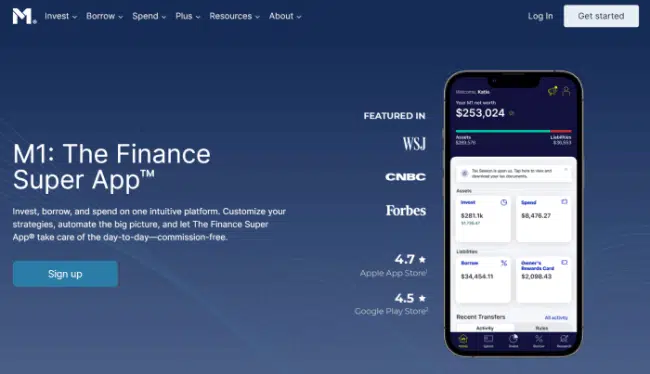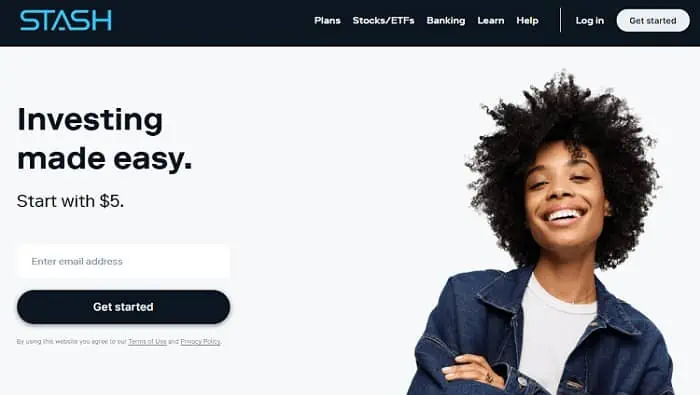Investing in your children’s future is a smart move. Not only will you be helping them, you will also secure your own financial stability for when they go to college, get married or need help with a down payment on a house.
One of the best ways to do this is by opening up a custodial brokerage account to meet the future needs of your child. These accounts offer some tax advantages, the ability to invest in numerous types of assets and are generally set up for children under the age of 18.
In this article, I’ll discuss these custodial brokerage accounts and other investment accounts for kids, how they work, and why you should consider opening one today!
Table of Contents
What Is a Custodial Account?
Kids are little sponges, soaking up everything they see and hear from their parents. This is why it’s important to create a financial plan for them before they’re old enough to understand the concept of money. It starts with debit cards for kids, then banking apps for teens and finally an investment account!
You don’t necessarily need these to happen in this order, but these can all serve as important steps toward developing comfort with money. When you open an investment account for kids, that typically means needing to open a custodial brokerage account. Though, investment accounts for kids also include plans like a 529 account, Education Savings Account and others.
Custodial accounts allow a custodian, typically a parent or guardian, to have an account held with a financial institution that holds assets for the benefit of the named minor on the account. This article covers custodial brokerage accounts in particular, and will help you to find the best custodial brokerage account for kids to invest in their future.
What Is a Custodial Brokerage Account?
Custodial brokerage accounts are financial accounts held in the name of a minor by one or more custodians. In this type of brokerage account, a custodian manages the investments held for the benefit of the minor named on the account.
Custodian is defined as “the person who manages assets for another” and typically refers to an adult who holds legal responsibility over the account on behalf of the child, usually a parent.
However, a custodian can be the child’s parent, guardian, spouse of their parent, grandparents or another relative.
Custodial accounts are typically used to save and invest for a minor in hopes that they will be able to use their funds in a more productive way when they reach adulthood.
Once you have opened a custodial brokerage account, you can use it for a variety of financial goals, including college savings, retirement or general investment purposes. Many use the account to teach some basic financial lessons about investing to their children.
You can use the opportunity to discuss investment choices and outcomes, review account statements and give them a vote on major decisions made with the funds held in the account. The custodian has the responsibility to manage and invest funds accordingly with trust that they act in their best interest at all times.
Custodial accounts come in two flavors: a UGMA and UTMA account, discussed next.
What Types of Custodial Accounts Are There?
Both UGMA and UTMA accounts are similar in that they are custodial accounts with assets held within them for the benefit of the minor.
Where they differ are the types of assets that can be held within each.
→ UGMA (Uniform Gifts to Minors Act) Accounts
UGMA (Uniform Gifts to Minors Act) accounts are custodial accounts typically set up by parents, guardians, grandparents or other relatives, who then serve as custodian for the child’s account until reaching the age of termination or majority in their particular state.
In most places this is 18, but other places require the minor to be 21 or older.
When friends and family contribute money to a UGMA account opened through a bank or stock broker, they do not fall subject to annual contribution limits.
Though, when making these financial gifts, they become irrevocable, meaning they can’t be taken back from the minor once transferred.
For this reason, it may be important to consult a lawyer or other qualified professional before setting up an account.
UGMA accounts can hold purely financial assets like cash, stocks, bonds, mutual funds, life insurance policies, and other financial instruments.
→ UTMA (Uniform Transfer to Minors Act) Accounts
UTMA (Uniform Transfer to Minors Act) accounts are also custodial accounts set up by parents or other custodians and are not limited to a certain dollar amount each year.
Where UTMA accounts differ is that they can hold any type of property, meaning they can hold the above financial instruments but also real estate and real property.
For example, you can place the deed to a home, car or other property into the UTMA account and transfer ownership to the minor.
Another key difference between a UGMA and UTMA account relates to state adoption policies.
All states have adopted UGMA accounts but Vermont and South Carolina have not allowed UTMA accounts.
If you live in either of these states, you’ll only have access to UGMA accounts.
Related: UTMA vs. UGMA: Differences Between These Custodial Accounts
What Is a Custodial Account for Stocks?
The primary point of opening a custodial account is to invest money in appreciating assets. Many parents and guardians use these accounts to invest for their kids and take advantage of compound interest as early as possible.
Working with them at a young age can instill good money habits and be useful for building wealth in the long-run.
Custodial accounts allow you to invest in stocks, bonds, exchange-traded funds (ETFs) and mutual funds, but not riskier assets like stock options or choosing to buy on margin.
Many brokers offer the ability to open a custodial account for stocks but may also limit the available options in a bid for simplicity.
These guardrails can keep the minor invested in diversified investments like index funds while avoiding the higher expenses of active trading and attempting to pick stocks or perform more in-depth stock analysis to understand which might outperform the market.
While all investing involves risk, these low-cost index funds will grow without worry that the minor will lose money if held for a long enough time period.
How Does a Custodial Account Work?
Once you open a custodial account, they work like any other account held with a bank or brokerage firm. Two main roles exist for custodial brokerage accounts:
- The custodian
- The beneficiary
In the case of a custodial brokerage account, the custodian—who acts as a designated manager or investment advisor providing investment advice and decision-making—decides how to invest money for the minor who owns the account.
The account manager—as well as other entities—can contribute to the fund an unlimited amount of money, though certain federal gift tax rules come into effect and may impact your tax return if you contribute more than federal limits allow to the minor child.
As discussed above, you can use custodial accounts to invest in a wide variety of assets and investment vehicles, though the institution offering the account will likely curb some types of investment decisions.
These financial institutions offer custodial accounts to protect the best interests of minors who own the assets in the account.
Therefore, they likely won’t allow the custodian to use the account to trade on margin nor buy stock futures, derivatives, or other highly speculative and unsuitable investments for the minor.
Once the minor reaches the age of termination, usually the same age as entering adulthood, the custodian relinquishes control of the account.
At this point, the assets transfer to the named beneficiary who can then claim full use of the funds held in the account.
Should the minor die before reaching the age of termination, the account becomes part of the child’s estate.
Custodial Brokerage Account: One of the Best Investment Accounts for Kids
Now that we know a lot more about custodial accounts, it’s time to answer the question of where to open a custodial account for your needs. You’ll have lots of options for specific tax advantages on educational savings plans for kids, but you may want to invest for other investment objectives as well.
There is no black and white when it comes to “the best custodial brokerage accounts,” but there are some considerations that can help you make a decision for what will work best for your individual financial situation. Consider these items before you open custodial accounts for kids:
- Fees. One of the most important considerations for choosing an account are the account fees you’ll encounter. Typically, custodial accounts have low or no fees if you are a customer with a brokerage account at a firm. That said, you may find some that charge trading commissions while others opt for a monthly fee and act as a free stock trading app within the account. Some even offer free stocks for signing up in the form of shares or a sign up bonus. Consider your preferred model.
- Account Minimums. Once you decide on an account, you’ll need to know how much money you must deposit to start with as well as the minimum balance required going forward, if any.
- Investment Options. You should also consider the types of investment options you’ll have available. Custodial accounts offer a wide range of investment choices, but some accounts provide guardrails with simplified offerings.
The custodial accounts that act as best investing apps for beginners focus on simplicity, functionality and ability to grow with the investor. Investing apps can be a one-stop-shop for everything finance related.
These apps provide comprehensive services to manage your finances, including investments, banking apps for kids and even debit cards.
There are a few related tasks that you can consolidate in order to improve the process of managing your child’s investment accounts.
Below are some custodial brokerage accounts to consider for investing in stocks with your kids. Some only allow the ability to invest in index funds as a means for placing guardrails on your kids’ investments while others allow individual stock investing.
| App | App Store Rating + Best For | Fees | Promotions |
|---|---|---|---|
 Acorns Early | ☆ 4.2 / 5 Automated investing in the background into diversified investments; Round-Ups | Acorns Gold: $12/mo. (required for Acorns Early Invest custodial account) | $20 bonus when you set up recurring investments and make your first successful recurring investment |
 M1 Finance | ☆ 4.7 / 5 Fee-free active trading and automated investing, Custodial IRAs | $0 trading or automated investing; $10/mo. or $95/yr. on M1 Plus subscription for custodial account | 3 months of M1 Plus for free |
 Stash | ☆ 4.7 / 5 Everyday people looking to start managing their finances | $3/mo.-$9/mo. | $5 stock bonus for making a deposit of $5 or more |
 UNest | ☆ 4.7 / 5 Age-based investments in custodial investment account | $4.99/mo. | New users get $30 free when they use promo code YOUNG30 and make their first deposit. |
 Firstrade | ☆ 4.7 / 5 No-fee investing with numerous investment-class options. | Commission-free trades | N/A |
| * Apple App Store Rating as of May 25, 2025 | |||
1. Acorns Early (Formerly GoHenry)

- Available: Sign up here
- Price: Acorns Gold: $12/mo., includes Acorns Early for up to 4 children.
Acorns Early (formerly GoHenry) offers a custodial brokerage account for parents interested in opening an investment account, which is available by subscribing to Early through Acorns Gold.
An Acorns Gold subscription comes with a free Acorns Early account for up to four children. More importantly, it also allows you to open an Acorns Early Invest account—a custodial account that not allows you to invest for your kids’ future, but offers a 1% match on up to $7,000 in contributions. Acorns Early offers investment portfolios of various risk levels for kids, so you can feel confident in the account you’re opening up for your little one.
This micro-investing app can be a great way to teach minors how to invest money. Acorns Early also comes with a Mastercard debit card that can be used in stores and online; it allows you to give your children an allowance or pay them for chores; and it has myriad of security guardrails, including chip-and-PIN technology, Mastercard Zero-Liability Protection, and parental controls.
Get an Acorns Early Invest account by signing up for an Acorns Gold subscription today or learn more in our Acorns review.
- Acorns allows you to sign up for investment, retirement, and checking accounts for you and your family, learn how to earn more money, and grow your investing knowledge.
- Famous for investing spare change automatically through Round-Ups, this all-in-one financial app helps younger generations start investing earlier.
- Invest in expert-built portfolios made up of diversified ETFs.
- Gold tier includes perks such as a 50% match on Acorns Earn rewards (up to $200/mo.), $10,000 in life insurance, picking individual stocks for your portfolio, a free Acorns Early account, and Acorns Early Invest custodial accounts with a 1% match.
- Earn even more with Later Match: Acorns will match up to 1% (Silver) or 3% (Gold) of all new IRA contributions.
- Special offer: Get $20 to start*.
- Robo-advisor with affordable fees (on larger portfolios)
- Fixed fee model
- Round-ups
- FDIC/SIPC insurance
- IRA match (Silver and Gold)
- High fixed fees for small balances
- Limited investment selections
- Must subscribe to Gold for any self-directed investing options
Related: Best Acorns Alternatives: Similar Micro-Investing Apps to Use
2. M1 Finance
- Available: Sign up here
- Price: Free trades, M1 Plus: $10/mo. or $95/yr.
M1 Finance is an all-in-one personal finance solution that allows new investors to set up an account in seconds. If you want to use this as a kids investing app, you’ll need to apply for an M1 Plus subscription. The company has a limited time offer of the first three months for free.
The service offers investors the ability to create Portfolio Pies, or a diversified portfolio that rebalances to help you achieve your money goals.
M1 Finance is a service designed for self-directed investors by offering flexible, customizable and automated financial solutions. The platform manages your money intelligently based on how you want.
Consider signing up for an M1 Finance custodial account.
Read more in our M1 Finance review.
- M1's Smart Money Management gives you choice and control of how you want to invest automatically, borrow, and spend your money—with available high-yield checking and low borrowing rates.
- Includes an FDIC-insured checking account and an M1 Visa debit card that delivers 1% cash back.
- Unlock perks including higher cash-back rewards on the M1 Owner's Rewards Credit Card, 4.25% APY from high-yield savings, ATM reimbursements, and 0% international fees.
- Invest in stocks, ETFs, and cryptocurrencies.
- Robo-advisor with self-directed investing capability
- Attractive cash-back and APY opportunities
- Doesn't support mutual funds
- Doesn't allow trading throughout the trading day
- Monthly fees for account balances <$10,000
Related: Best Debit Cards for Teens
3. Stash Invest ($5 Bonus)
- Available: Sign up here
- Price: Growth: $3/mo, Stash+: $9/mo
Stash is an all-in-one financial management platform, complete with investing, spending and banking functionality.
The app targets individuals just starting on their financial journey by making everything covered on the app accessible to all levels of financial literacy.
With time, the app aims to build up your financial skills and make you confident with your ability to manage and plan your money.
By signing up, you also can receive a $5 bonus for making your first deposit on the app.
Learn how to get free stocks and other sign up bonuses to add a jumpstart to your investments.
- Stash is a personal finance app that simplifies investing, making it easy and affordable for everyday Americans to build wealth and achieve their financial goals.
- Invest in stocks and exchange-traded funds (ETFs) for as little as 1¢ thanks to fractional shares.
- Earn Stock-Back® rewards on every eligible debit card purchase.
- Sign up for Stash+ and get access to custodial accounts, better Stock-Back® rewards, and access to $10,000 in life insurance.
- Special offer: Earn a $100 bonus when you sign up with Stash and make a $250 deposit.
- Robo-advisor with self-directed investing capability
- Fractional shares
- Custodial accounts available
- Offers values-based investment options
- Get paid up to two days early when you direct deposit pay into your Stash account
- FDIC/SIPC insurance
- Charges monthly fee
- Smart Portfolios don't offer tax-loss harvesting
4. UNest
- Available: Sign up here
- Price: $4.99/mo.
UNest is a custodial account that allows parents to invest money for their kids to pay for many of life’s major milestones—college, a new car, a wedding, a vacation, or anything else a minor might want someday.
UNest offers the UNest Investment Account for Kids through its app, which makes it easy for families of all income levels and backgrounds to set up and manage savings and investment plans for their kids. UNest also has a gifting feature that allows friends and relatives to contribute to your kid’s account with just a few clicks. These personalized gifts can be automated, too, so they never miss a birthday or holiday!
The app offers up several investment options for account owners:
- A conservative option investing in fixed income and bond ETFs
- Three age-based options with varying degrees of risk reflected in the investment mix (conservative, moderate, aggressive); these transition from more aggressive investments to conservative as the child gets owner and gains access to the funds
- Three socially responsible age-based options also with varying degrees of risk (conservative, moderate, aggressive), likewise on the investment mix transition strategy from aggressive to conservative over time
- An aggressive option that invests 100% of the funds in Vanguard equity index ETFs
You can also invest in cryptocurrencies for your child through a separate UNest Crypto account.
Account holders can receive bonuses for their children’s UNest accounts via partner offers from companies such as Disney, AT&T, Uber, DoorDash, Levi’s, and more, through the UNest partner program.
- UNest is a tax-advantaged custodial investment account for kids. It allows them to save for an education, first car, house, wedding, or even for their financial security as an adult.
- Friends and relatives can gift to your child's account with just a few clicks, or even automate their gifts.
- UNest's investment options are portfolios of various low-cost ETFs that can achieve a variety of goals. They include a conservative portfolio made up of just fixed income and bond ETFs; three age-based options that hold bonds and stocks in conservative, moderate, or aggressive allocations; three similar options that are centered around socially responsible investments; and an aggressive portfolio made up of only stock ETFs.
- Accounts enjoy up to $2,500 in tax advantages: $1,250 is tax-free, and the other $1,250 is taxed at the child's tax rate.
- Special offer: New users get $30 free when they use promo code YOUNG30 and make their first deposit.
5. Firstrade
- Available: Sign up here
- Price: Free stock/ETF trades
Firstrade is a leading online brokerage firm offering a full line of investment products and tools designed to help investors improve their financial position through sound investing practices.
One unique feature of Firstrade is that it allows minors to invest (with a custodial account managed by their parents).
As a result, I feature this as one of the best investing apps for minors to buy stocks. It’s a great resource for kids to gain early exposure to the stock market through a custodial account and to start compounding their money from a young age.
- Firstrade is a low-cost leader in trading stocks, ETFs, mutual funds, and options. In addition to standard commission-free offerings of stocks, ETFs, and options, Firstrade charges no options contract fees, and offers free trading of mutual funds as well.
- Also trade cryptocurrency and bonds on Firstrade.
- Beginners can get up to speed with Firstrade's robust education center, which offers written and video lessons covering everything from the basics of stocks to advanced options concepts.
- Very good selection of available investments
- Commission-free mutual funds
- No options contract fees
- High margin rates
- Below-average customer support
Should I Open a Brokerage Account for My Child?
A custodial brokerage account can serve as an excellent way to make a financial gift to a child. This can be for your own child but also a child of a relative or friend.
This type of account can go toward a child’s future benefit but you’ll also want to consider the legal and tax implications of opening one first.
From a tax perspective, these accounts provide some tax advantages by shielding a certain amount of unearned income from taxation each year while allowing another portion to remain subject to taxes only at the child’s tax rate.
Above this, the parent’s tax rate absorbs any income in excess of these limits.
While good in some respects, especially compared to a traditional taxable brokerage account, if the real goal for these funds is long-term appreciation for a safe and secure retirement, opening a custodial IRA might be more fitting.
This requires the minor to have earned income, but it also carries these tax advantages through retirement and not just an annual income level in the account. Plus, you’ll need to pay capital gains taxes on the assets held in the custodial account when you sell at some point in the future.
As a final point, these accounts may mean you’ll need to file annual tax returns for your child. While not a problem for some, this can be an added hurdle you don’t wish to cross.
As for the legal ramifications, the assets held in the account legally belong to the minor. This means they will count on the FAFSA as available financial resources and could potentially reduce available needs-based financial aid.
All of this said, these accounts still provide a powerful way to start investing as a minor and will certainly outperform funds held in a savings account or other banking apps for minors while also building potential investment income down the road.
Compared to doing nothing or investing in a standard brokerage account, these accounts can provide plenty of upside worth considering as well.
Paired with a bank account and useful investing books for kids, this account can serve as a solid financial foundation for teaching kids about financial literacy with skin in the game.
Related: How to Open a Brokerage Account for a Child
How to Decide if a Custodial Brokerage Account is Right for You
- Considered the minor’s asset. The gifts made into the account become the property of the minor and cannot return to the contributor.
- Transferred to the minor at a certain age (between 18–25). These assets transfer to the minor at the age of termination, which is often the age of majority in their state of residence unless stated otherwise in the titling of the account.
- Made with after-tax money, though there are tax benefits. Not as tax-efficient as retirement accounts, but the money contributed does enjoy some tax buffer on unearned investment income subject to certain limits.
- A brokerage account for investing. These accounts allow you to invest on behalf of a minor, teaching how to do it, how to assess risk and ultimately how to build wealth to last a lifetime.
- Factored into financial aid eligibility. These assets technically belong to the minor. Therefore, they count toward financial assistance eligibility when applying to college and seeking financial help with paying for college.
- A way to directly transfer wealth. These accounts simplify the transfer of wealth from trust funds in the past. They offer little complexity and tremendous flexibility with respect to contribution limits, withdrawals and how you can invest inside the account.
What Other Investment Accounts for Kids Should I Consider?
If you want to accomplish specific goals with these funds, you have other available options to consider.
- 529 plans. If you’d like to save money specifically meant for college or other qualified educational expenses, consider opening a 529 account with a company like Backer instead.
- Custodial Roth IRAs. If you’d like to get an early start on saving for your child’s retirement, consider a custodial Roth IRA for kids instead. This allows kids who have earned income to contribute at a presumably lower tax rate than when they’re adults and gain more years of compounding returns. Companies like E*Trade offer these accounts for kids.
- Trust Funds. If you’d like more flexibility with respect to the timing of when the money transfers, and not just the age of termination or majority, consider opening a trust fund.
Have a look at the graphic below to learn about all the banking and investment accounts for kids.
Related:
- Best Credit Cards for Kids: Build Credit & Money Habits Early
- Best Credit Cards for No Credit History: Starter Credit Cards
When Must a Custodial Account Be Transferred?
Upon reaching the age of termination a custodian must transfer a minor’s account to her/his name. This is not always the same as reaching the age of majority. In most cases, the age of termination comes later. If these ages differ, they will potentially appear in the titling of the account.
The age of majority means once the minor becomes of the majority, or said plainly, becomes a legal adult in their state of residence. Further, it grants individuals the ability to enter into contracts, meaning no more “defense of infancy”.
In most states, this is the age of 18, except some places have ages 19 or 21 as those triggering events. In many states, the age of majority is 18. However, it can be 21 in some and even as late as 25 elsewhere. If you choose an age of termination greater than 21, there are important tax considerations that should be evaluated. Consult an attorney or tax advisor to discuss your options.
Who Can Contribute to a Custodial Account?
Anyone can contribute to a custodial account. This includes family members like parents and grandparents, but also other family members like aunts and uncles, cousins, and more.
It also means friends can contribute money as well. Because so many different types of people can contribute money to custodial accounts, you can use them to buy mutual funds, exchange traded funds, or other stocks for kids to grow these assets for the child’s future wants and needs.
These accounts make useful gifts for major milestones and celebrations.
Are There Contribution Limits?
Custodial account owners can receive as many contributions as they have offered because brokerage accounts classified as either UGMA or UTMA do not have contribution limits. Further, these accounts don’t have minimums in every case, but you’ll need to check the rules or the accounts to see if you’d encounter account fees for violating certain minimums.
You may also find certain investments carry minimum investment amounts, such as one share of exchange traded funds or other stocks that get held in UTMA custodial accounts or UGMA custodial accounts.
Who Pays Taxes on a Custodial Account?
A portion (up to $1,300) of any earnings from a custodial account usually qualifies as tax-exempt unearned income, at least from federal income tax. From there, a second portion of equal limit (also up to $1,300) of any unearned income from the custodial account will get taxed at the child’s tax rate. Typically, this rate falls below that of the parent or guardian. Above this amount, any unearned income from the account gets taxed at the parent’s tax rate.
Further, individuals can gift up to $18,000 per year per individual ($36,000 for a married couple) to avoid the federal gift tax in 2024. More details on both of these items appears below.
What Is the Kiddie Tax?
One issue that parents need to be aware of is the Kiddie Tax rule. Due to this rule, a child could have taxes owed on investment returns. The government noticed that people were using a loophole in the tax code to give their kids stocks as gifts. The federal government introduced the kiddie tax, preventing people from taking advantage of this loophole.
This is a tax to pay on the unearned income in custodial accounts. This rule applies to all investment income for kids under 19 or full-time students under 23. This doesn’t make the child pay higher taxes than those currently paid on their current wages.
The IRS allows the first $1,300 of unearned income to be tax-free, the second $1,300 to be taxed at the child’s rate and then any balance above that at the parents’ rate.
This means that if you put $1,500 into an Acorns account each year for your teenager and they earn under $1,000 in dividends, that counts as tax-free income.
However, if they receive $1,600 in dividend income from these cash flowing assets, you will need to pay taxes on $300 of that amount on behalf of your kids at their rate.
If the account has $2,800 in dividends, $1,300 will go untaxed, $1,300 will be at the child’s tax rate and $200 at the parents’ rate.
If your child takes this income out of the account, this could be a good way to teach teenage money management.
Related:
- 36 Passive Income Ideas [Income Investments to Consider]
- 18 High-Yield Investment Options [Best Investments Right Now]
What Is the Gift Tax?
You can gift money to another person tax-free if you meet certain limits each year.
For custodial brokerage accounts, you and others can contribute your financial gift to the account holder through their UTMA account or UGMA account and manage it with their ability to see how you handle the investments together.
A single adult can contribute up to $18,000 per year to the custodial account while a couple can contribute up to $36,000 per year if they file taxes jointly.
You can also learn how to gift stock to family and loved ones.
When Can I Make Withdrawals?
You can withdraw money at any time but must be for the benefit of the minor.
While all withdrawn funds must go “for the benefit of the minor,” the vagueness of this requirement means account holders don’t need to use funds strictly for a specific purpose.
This means funds don’t need to go to educational costs, for example, as they do with a 529 account without a tax consequence.
Instead, the custodian may use the funds for any needs the minor beneficiary has so long as they qualify “for the benefit of the minor.” That can mean everything from providing a place to live, buying clothing or paying for meals.
Read more about custodial account rules.
What Are the Pros and Cons of a Custodial Account?
Pros of Custodial Accounts
- Flexibility. Custodial accounts come with tremendous flexibility in terms of contribution limits, withdrawals and lack of required distributions. They also offer significant investment options for the minor.
- No withdrawal penalties. Taking money from a custodial account doesn’t incur penalties.
- No specific use for funds. The funds must go toward the benefit of the child but that can include things as innocuous as clothing, food and shelter.
- Simpler and less expensive than a trust. Establishing and managing a custodial account carries far less expense and time than using a trust fund. Legislators established the rules for UGMA and UTMA accounts to allow adults to transfer assets to minors without needing to establish special trusts.
- Tax advantages. Custodial accounts allow certain levels of unearned income to escape taxation or fall to the likely lower income tax rate of the minor.
- Don’t need earned income. These accounts do not require the minor to have earned income to grow the account balance through contributions. Unlike retirement accounts, custodial accounts do not need the owner to have earned income to contribute or receive contributions.
Cons of Custodial Accounts
- May reduce financial aid eligibility. The assets held in a custodial account technically count as assets of the minor. Therefore, these go on the FAFSA as assets of the minor they can use to finance their college education. This can limit the amount of financial aid available if the money would need to be awarded on a needs-basis.
- Deposits become irrevocable gifts. Deposits made into custodial accounts become the irrevocable assets of the minor. These funds cannot return to the contributor. In contrast, the assets of a 529 plan can allow parents to retain control and possibly change the account beneficiary should one child not need the assets due to receiving scholarships, financial aid or choosing not to attend college.
- Non-transferable assets. Custodial accounts have a designated beneficiary and cannot transfer these assets to others. Custodians can transfer these assets to a 529 plan, though the custodian must liquidate any non-cash investments in the account to do so, potentially triggering tax liability for the parent or legal guardian.
- Not as tax-sheltered as other accounts. These accounts do not carry the full tax advantages of other types of investment accounts, namely retirement accounts or health savings accounts.
Investment Accounts for Kids: Custodial Brokerage Accounts
Investing for kids is an exciting time. However, it can be a confusing and daunting process to figure out what the best investment account is. To help you make this important decision, we put together this list of custodial brokerage accounts that are perfect for your child’s first account.
Custodial accounts can keep kids’ attention and give them a reason to track stocks and monitor portfolio performance. You have a number of available options which allow you to open a custodial account for kids and use the actions as a teaching tool.
Done correctly and with care, kids can take to investing from an early age and start themselves off on a sustainable financial path.


























